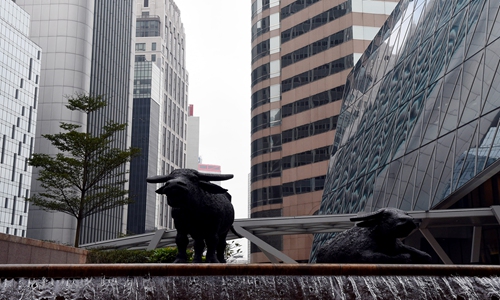HOME >> BUSINESS,SPECIAL-COVERAGE
HK shares unshaken by external factors
By Xie Jun and Song Lin Source:Global Times Published: 2019/11/24 23:23:40 Last Updated: 2019/11/25 0:50:11
Few ripples from US passage of pro-rioters bill

A corner of the stock exchange in Hong Kong Photo: VCG
No stocks tumbling. No capital flight. Hong Kong's capital markets have been as solid as a rock despite external interference, especially the passage of a bill by the US Congress that supports Hong Kong rioters.
Such calm underlines Hong Kong stock market's solid foundation, given its high market-oriented level and backbone from the economy in the Chinese mainland, experts commented.
Hong Kong's financial markets have "responded calmly" and "operated as usual," with a stable currency exchange rate and no signs of strong capital outflows, after the US Congress approved the so-called "Hong Kong Human Rights and Democracy Act" last week, wrote Paul Chan Mo-po, financial secretary of the Hong Kong Special Administrative Region (HKSAR) in a blog on Sunday.
The Hong Kong official went on to criticize the US' passing of the bill as "ungrounded," saying that the US government should not poke its nose into Hong Kong affairs.
"The US has huge economic and other benefits in Hong Kong and has always benefited from the sizable trade surplus it has with Hong Kong. Besides, there are more than 1,300 US corporate branches in Hong Kong," he said, adding that the US government should act cautiously to avoid losses by both sides.
The Hong Kong rioter-supportive bill was passed by both houses of the US Congress last week and is on the way to the signature of US President Donald Trump, Reuters reported.
It added that the bill requires regular reviews of the city's special financial status.
The Hong Kong stock market felt only a ripple from the news despite the sensation it caused in overseas media.
Hong Kong's benchmark Hang Seng Index edged down 0.75 percent and 1.57 percent on Wednesday and Thursday, and corrected by 0.48 percent to 26,595.1 points on Friday.
The Hong Kong dollar edged up by 0.02 percent and 0.05 percent against the greenback on Wednesday and Thursday.
"The bill shows the intention of the US to obstruct China's development via Hong Kong-related issues. But it is meaningless as the US can't change the world's optimistic outlook on the prospects of Hong Kong or the mainland," Zhang Yi, CEO of Shenzhen-based iiMedia Research, said on Sunday.
Shorting selling meaningless
Experts have condemned any external efforts to crack down on Hong Kong's capital markets as being meaningless, stressing that the bourse offers a solid valuation for its listed shares.
The Hong Kong stock market "can well represent the shares' fundamental values, thanks to the high level of marketization and internationalization of the market," Li Daxiao, chief economist at Shenzhen-based Yingda Securities, told the Global Times on Sunday.
Sunday marks the 50th anniversary of the benchmark Hang Seng Index.
Hong Kong's benchmark stock gauge Hang Seng Index has soared by about 16,700 percent from its debut 50 years ago, according to a Bloomberg report on Saturday.
Li particularly mocked the possibility of damaging the Hong Kong economy via short selling on the share market, saying that such hopes are in vain and the fundamental conditions for such a move are missing.
"The Hong Kong stock market has been seeing increasing liquidity and companies seeking listings from the Chinese mainland. This, plus the Hong Kong stock market's strong valuation base, makes the so-called shorting activities very difficult," he said.
There have been overseas reports about short sellers looking at the Hong Kong stock market to take advantage of the current instable social situation, with the city mired in violence for around half a year.
But a securities analyst surnamed Liang, who is also a Hong Kong stock observer, told the Global Times on condition of anonymity that the number of short deals has decreased on the Hong Kong stock market recently.
"Hong Kong's financial sector has achieved a relatively high margin of safety. The most volatile phase has already passed," Liang said.
Experts also noted that the Hong Kong capital market will stand up to external obstruction, given the support it receives from the flourishing mainland economy.
They made the comments about two days ahead of mainland e-commerce giant Alibaba's mammoth secondary listing on the Hong Kong stock market, injecting what is deemed as a much-needed vote of confidence into the riot-hit city and its financial sector.
"Alibaba's Hong Kong listing shows the confidence of not only Alibaba, but global capital, in the city. Otherwise the international shareholders of Alibaba, including those from the US and Japan, wouldn't give a nod to the decision," Zhang said.
Posted in: INDUSTRIES,MARKETS,FOCUS NEWS,CHINA-US FOCUS